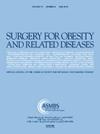A randomized, double-blind, placebo-controlled trial of weight loss using liraglutide 3.0 mg for weight recurrence after Roux-en-Y gastric bypass
IF 3.5
3区 医学
Q1 SURGERY
引用次数: 0
Abstract
Background
Bariatric surgery, such as Roux-en-Y gastric bypass (RYGB) remains the gold standard for treating obesity. Most people regain weight from postsurgery nadir.
Objectives
Liraglutide 3.0 mg is approved for weight management. This study will examine the effects on liraglutide 3.0 mg on weight regain post-RYGB.
Setting
University Hospital, United States.
Methods
A 56-week, double-blind, placebo-controlled study was conducted in 132 subjects, who achieved ≥25% total body weight loss (TBWL) status-post-RYGB and regained ≥10% TBWL after reaching nadir weight (NW). Subjects 18–120 months post-RYGB were randomized to receive liraglutide 3.0 mg/d (n = 89) or placebo (n = 43) with lifestyle counseling regularly for 56 weeks. The co-primary endpoints were the proportion of subjects losing at least 5%, 10%, and 15% TBWL and achieving weight lower than their NW.
Results
53.4% of the placebo group and 65% of the liraglutide group completed the trial due to Severe acute respiratory syndrome coronavirus 2 pandemic. The change in %TBWL from baseline to 56-weeks was −8.8 (8.5, −29.2 to 9.7) and 1.1 (3.5, −7.9 to 5.99) in the liraglutide and placebo groups, respectively. 76% and 17% of subjects achieved ≥5% TBWL at 56 weeks in the liraglutide and placebo groups, respectively; 51% and 26.0% of the liraglutide group achieved ≥10% and ≥15% TBWL, respectively. None of the placebo group lost ≥10% TBWL. Twenty-one percent of subjects receiving liraglutide surpassed postoperative NW. No subjects on placebo met this goal. Nonserious adverse events occurred in 41.6% of subjects on liraglutide. Serious adverse events (SAE) occurred less often on liraglutide.
Conclusions
Liraglutide was significantly more effective than placebo in treating weight regain that occurs post-RYGB without increased SAE.
使用利拉鲁肽 3.0 毫克治疗 Roux-en-Y 胃旁路术后体重复发的随机、双盲、安慰剂对照减肥试验。
背景:减肥手术,如 Roux-en-Y 胃旁路术(RYGB),仍然是治疗肥胖症的金标准。大多数人的体重会从手术后的最低点反弹:利拉鲁肽 3.0 毫克已被批准用于控制体重。本研究将探讨利拉鲁肽 3.0 毫克对 RYGB 术后体重反弹的影响:地点:美国大学医院:方法:在 132 名受试者中开展了一项为期 56 周的双盲安慰剂对照研究,这些受试者在 RYGB 术后达到≥25% 的总体重减轻(TBWL)状态,并在达到最低体重(NW)后恢复了≥10% 的总体重减轻(TBWL)。RYGB术后18-120个月的受试者随机接受利拉鲁肽3.0 mg/d(n = 89)或安慰剂(n = 43)治疗,并定期接受生活方式咨询,为期56周。共同主要终点是受试者TBWL至少下降5%、10%和15%以及体重低于其NW的比例:由于严重急性呼吸系统综合征冠状病毒 2 大流行,53.4% 的安慰剂组和 65% 的利拉鲁肽组完成了试验。从基线到56周,利拉鲁肽组和安慰剂组的TBWL%变化分别为-8.8(8.5,-29.2至9.7)和1.1(3.5,-7.9至5.99)。56周时,利拉鲁肽组和安慰剂组分别有76%和17%的受试者实现了≥5%的TBWL;利拉鲁肽组分别有51%和26.0%的受试者实现了≥10%和≥15%的TBWL。安慰剂组中没有人的 TBWL 下降≥10%。21%接受利拉鲁肽治疗的受试者超过了术后净体重。安慰剂组没有受试者达到这一目标。41.6%的利拉鲁肽受试者发生了非严重不良事件。利拉鲁肽的严重不良事件(SAE)发生率较低:结论:利拉鲁肽治疗RYGB术后体重反弹的效果明显优于安慰剂,且不会增加SAE。
本文章由计算机程序翻译,如有差异,请以英文原文为准。
求助全文
约1分钟内获得全文
求助全文
来源期刊
CiteScore
6.70
自引率
12.90%
发文量
570
审稿时长
56 days
期刊介绍:
Surgery for Obesity and Related Diseases (SOARD), The Official Journal of the American Society for Metabolic and Bariatric Surgery (ASMBS) and the Brazilian Society for Bariatric Surgery, is an international journal devoted to the publication of peer-reviewed manuscripts of the highest quality with objective data regarding techniques for the treatment of severe obesity. Articles document the effects of surgically induced weight loss on obesity physiological, psychiatric and social co-morbidities.

 求助内容:
求助内容: 应助结果提醒方式:
应助结果提醒方式:


